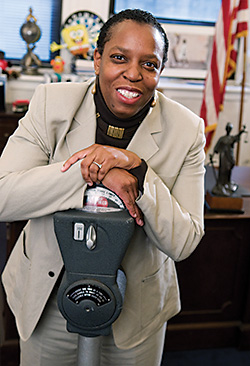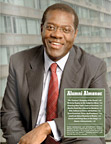The Collector
Law Women’s Alumna of the Year is New York City Commissioner of Finance Martha Stark.
Printer Friendly Version Spend an hour with Martha Stark ’86, and you’ll come away with little doubt that she’ll find a simple solution to any complex problem presented to her. She spent a winter afternoon assembling a bookshelf and television stand just for the fun of it. Puzzles, thorny math problems, the intricacies of the tax code, build-it-yourself furniture, you name it; New York City’s Commissioner of Finance isn’t afraid to roll up her sleeves. “I like to fix things,” she says simply with a broad smile, her right leg tucked neatly under her left while she sits on a sofa in her toy-and-artifact-filled office. “I like putting things together in a logical way.”
Spend an hour with Martha Stark ’86, and you’ll come away with little doubt that she’ll find a simple solution to any complex problem presented to her. She spent a winter afternoon assembling a bookshelf and television stand just for the fun of it. Puzzles, thorny math problems, the intricacies of the tax code, build-it-yourself furniture, you name it; New York City’s Commissioner of Finance isn’t afraid to roll up her sleeves. “I like to fix things,” she says simply with a broad smile, her right leg tucked neatly under her left while she sits on a sofa in her toy-and-artifact-filled office. “I like putting things together in a logical way.”
For the chief of a department that oversees a staff of 2,300 and collects $23 billion in taxes from New York residents every year, that’s a handy attribute to have. Martha Stark is the recipient of the NYU Law Women’s third annual Alumna of the Year Award and the city’s first African-American woman to serve as finance commissioner. She holds a complex job: The finance department not only collects the city’s property and business taxes, but also runs the city treasury, records all mortgages and deeds and even adjudicates parking tickets. That last item explains why she’s so attached to the retired meter parked behind her desk.
Stark is not your typical bureaucrat. Her office is jam-packed with an eclectic mix of objects, from a basketball net to a Jamaican cooking pot. A Mr. Potato Head shares space with an antique bowling trophy on her credenza, and an inflatable SpongeBob hangs below a dartboard. “He can be whomever I want him to be when I throw those darts,” she chuckles. “It depends on who I’m mad at.”
That SpongeBob doesn’t have a single puncture hole says a lot about the 47-year-old Stark—and her aim. She has such an easygoing manner, it’s hard to imagine her angry at anyone. But don’t be fooled; Stark is no pushover. “She keeps you on your toes,” says Mary Gotsopoulis, chief administrative law judge for Finance’s adjudication division, who reports to her. “She may not agree with you, but she’ll always listen to what you have to say. You have to really convince her though, because she knows every aspect of this agency. She’s very hands-on.”
Stark’s detailed grasp of how her agency works again demonstrates her innate talent for pushing aside noise and static to focus on what’s important. That helps explain her natural affinity with math and statistics. Born and raised in Brownsville, Brooklyn, this graduate of Brooklyn Tech High School has been intrigued with numbers since she played math games with her bookkeeper father, a high school dropout who taught her to fill out tax returns when she was 15. “I believe in the power of numbers,” she said in a 2006 commentary on the National Public Radio program All Things Considered. “Maybe it is just that numbers don’t lie.” So when you hear Stark say with utter sincerity, “I have a passion for property tax,” you can’t help believing her. For Stark, her job is the equivalent of a math junkie’s Nirvana: the intersection of policy, law and numbers, a place she firmly believes has a direct impact on people’s lives.
Her stint as finance commissioner—she was appointed by Mayor Michael Bloomberg in 2002—is not her first in city government. She served in several management positions in the city’s finance department under Mayor David Dinkins from 1990 to 1993. Among her accomplishments: the establishment of a unit that allows for the arbitration of business tax disputes. In 1993, she was named a White House Fellow, assigned to the Department of State. She has also worked as the head of policy operations under Manhattan Borough President Ruth Messinger.
Stark didn’t always intend to work for government. At first, she thought she wanted to be a journalist, but after a serious biking accident in 1980 during her junior year at NYU, she changed her mind. To make up for time lost due to her hospitalization, she switched majors to political science, which eventually led her to law school. That was the positive aftereffect of her accident; the negative robbed her, at least in the short run, of her other passion: basketball. As an undergrad, she played forward for NYU—and now she frequently cheers on her favorite Women’s National Basketball Association team, the Liberty.
Her love of basketball and the discipline and teamwork it requires fits into her can-do approach to the law. While she worked as a tax attorney for only four years before she moved into city government, she believes that studying the law helped her figure out how to effectively push for change. “Knowing the law matters,” she says. “But far too often we say, ‘Here are the rules; this is what you can’t do.’ What’s great about the law is that the rules can be changed. It gives you the freedom and the flexibility to be creative.”
In the end, that’s what matters most to Stark: using her prodigious intellectual, legal and financial skills to keep the city’s ship afloat.
—
